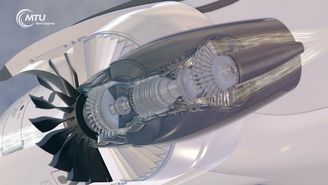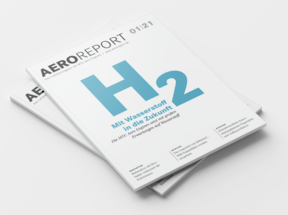
Press archive detail
ILA 2014: MTU Aero Engines well positioned for the future with its engine portfolio
- A presence in all market segments, with the commercial business markedly growing and the military business remaining stable
- Geared Turbofan™ engine family is setting new technological and economic standards
Berlin, May 21, 2014 – At its press conference on the occasion of the ILA Air Show in Berlin on Wednesday, May 21, MTU Aero Engines gave a rundown of its mix of commercial and military engine programs and maintenance services that put the company in a strong position for the future. As Germany’s leading engine manufacturer said, in a nutshell, tomorrow’s aircraft propulsion systems will have to be quieter, more fuel economic and cleaner; for the engine has a significant impact on fuel and maintenance costs and on noise. The company’s focus is clear: “By 2018, we want to have established a strong position in all engine segments – and this holds true for both the OEM and the MRO businesses,” stresses MTU CEO Reiner Winkler.
Winkler is pleased with the market environment: Global passenger air traffic is growing steadily, and along with it the demand for new aircraft and engines. The number of aircraft in service worldwide is projected to increase to up to 40,000 by the year 2035 – almost twice as many as today. MTU Aero Engines has spotted this trend early on and has taken stakes in the commercial engine programs of the future; notably, Pratt & Whitney’s Geared Turbofan™ (GTF) family of engines plays a pivotal role in this success. Now, says Winker, it is crucial for Germany’s leading engine manufacturer to deliver the GTF engines to the aircraft manufacturers, and hence to the airlines, on schedule. “So we’ll have two major tasks to accomplish: For one, we need to achieve the development objectives – with fuel consumption and weight being the primary considerations – and, for another, we need to stick to the schedules for development, testing and certification. We achieved key milestones in fiscal 2013 and are on track to meet both of these goals.”
Full speed ahead in the commercial and military engine programs
“MTU thrives on innovation. This is why innovative power and top-notch technologies are vital elements in our continued strategic development. Time and again, they put us in a position to come up with new and better solutions to fit our customers’ specific needs,” is how Michael Schrey¬ögg, Chief Program Officer at MTU Aero Engines, describes his objective.
MTU is doing very well in its commercial engine business. The geared turbofan is setting new standards in environmentally friendly propulsion system technology. As things stand today, the GTF burns 15 percent less fuel than conventional models, reduces CO2 emissions by 15 percent and the perceived noise level is cut in half. The huge success of the A320neo medium-haul jet in the market goes to show that at the moment, the engine industry is setting pace in the development of environmentally compatible aviation technologies. With its high-speed low-pressure turbine, MTU is contributing a key component to the engine powering the aircraft. Moreover, in collaboration with its U.S. partner, MTU is developing and building the high-pressure compressor. The geared turbofan engine has been chosen to power the Airbus A320neo, the Bombardier CSeries, Embraer’s new generation of E-Jets, the Mitsubishi Regional Jet, and the Irkut MS-21. Other key revenue drivers in the company’s commercial OEM business, including spare parts sales, are the V2500 for the Airbus A320 family, the GP7000 for the A380, and the GEnx for the Boeing 787 and 747-8.
Schreyögg said that MTU’s military business continued to be stable, despite declining defense budgets. “Therefore the present situation calls even more for protecting technological know-how and competence in the company”, concludes Schreyögg. “Only those who have the key technologies from tomorrow in view, will take part in future impulses.” In the coming decades the EJ200 engine powering the Eurofighter Typhoon and the TP400-D6 engine powering the A400M military airlifter will remain important engines in MTU’s portfolio and generate sales in production and repair. There are promising prospects to win new customers for both aircraft also outside Europe. MTU continues to have its sight set primarily on the U.S. military market, the largest in the world. The German engine maker has already taken stakes in GE’s F404, F414, F110, und GE38 programs. With the GE38 helicopter engine, MTU, in a first for the company, not only has a production share, but has also assumed development responsibility. Should plans for a GE38-powered future European heavy transport helicopter go forward, the German engine company has already secured licenses for final assembly, maintenance and testing.
MRO: a market in the midst of transformation
As MTU sees it, the commercial maintenance, repair and overhaul (MRO) business is in the midst of a major shift; an increasing number of customers opt to buy not just the next-generation engines, but also the entire know-how they need to operate the propulsion systems more efficiently for them to be more successful. Key factors, apart from the engine, are a reliable supply of spare parts and provision of maintenance services. “The lines between the engine OEM and MRO businesses are increasingly getting blurred,” explains Winkler. “Together with our partners we are actively forming this change of the business model and are working to ensure we get involved in the entire value chain right from the outset. This approach creates enormous opportunities for MTU.”
Here is a summary of MTU’s facts and figures: The guidance for fiscal 2014 remains unchanged. According to its forecasts, the MTU Group will generate consolidated sales of around 3,750 million euros. Its EBIT and net income are expected to be stable. MTU Aero Engines places a clear focus on investments into the future: the expansion of geared-turbofan production; an increase in capacities at its facilities; and the stakes in engine programs for widebody and narrowbody aircraft, which play a key role strategically.
For more information, visit us in Hall 2 (Booth No. 2301) at the ILA Berlin Air Show 2014.
About MTU Aero Engines
MTU Aero Engines is Germany's leading engine manufacturer and has been a key player in the global engine industry for 80 years. It engages in the development, manufacture, marketing and support of commercial and military aircraft engine modules and industrial gas turbines. The company is a technological leader in low-pressure turbines, high-pressure compressors, manufacturing processes and repair techniques. Figuring significantly among MTU's core competencies are the maintenance, repair and overhaul (MRO) of commercial engines and the service support it provides for industrial gas turbines. These activities are combined under the roof of MTU Maintenance, which is one of the world’s largest providers of commercial engine MRO services. MTU operates affiliates around the globe; Munich is home to its corporate headquarters. In fiscal 2013, the company had a workforce of some 8,700 employees and posted consolidated sales of some 3.7 billion euros.
Contact

Senior Vice President Corporate Communications and Public Affairs



